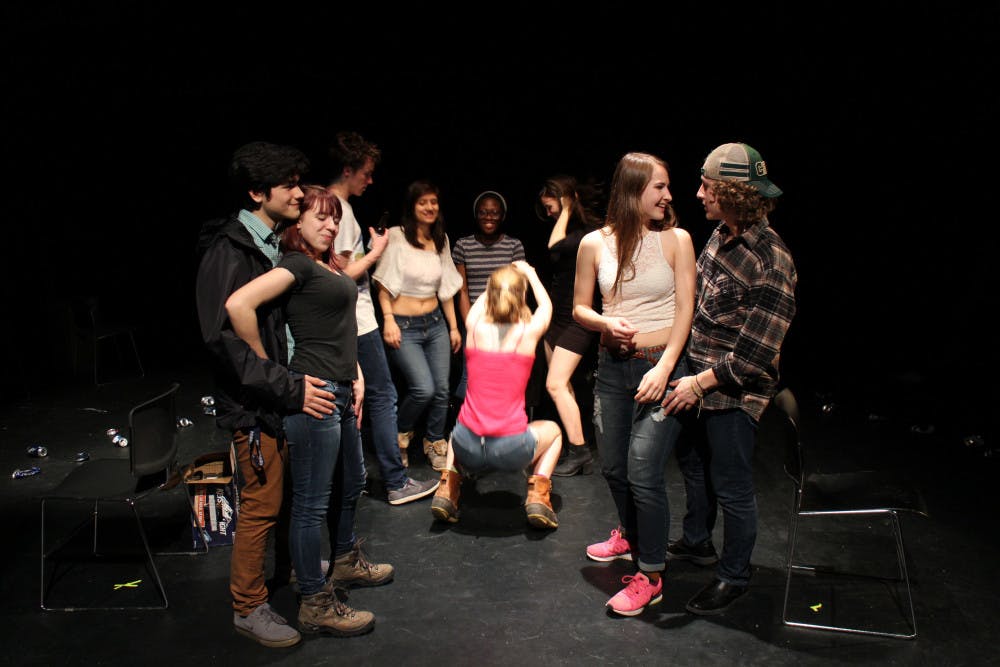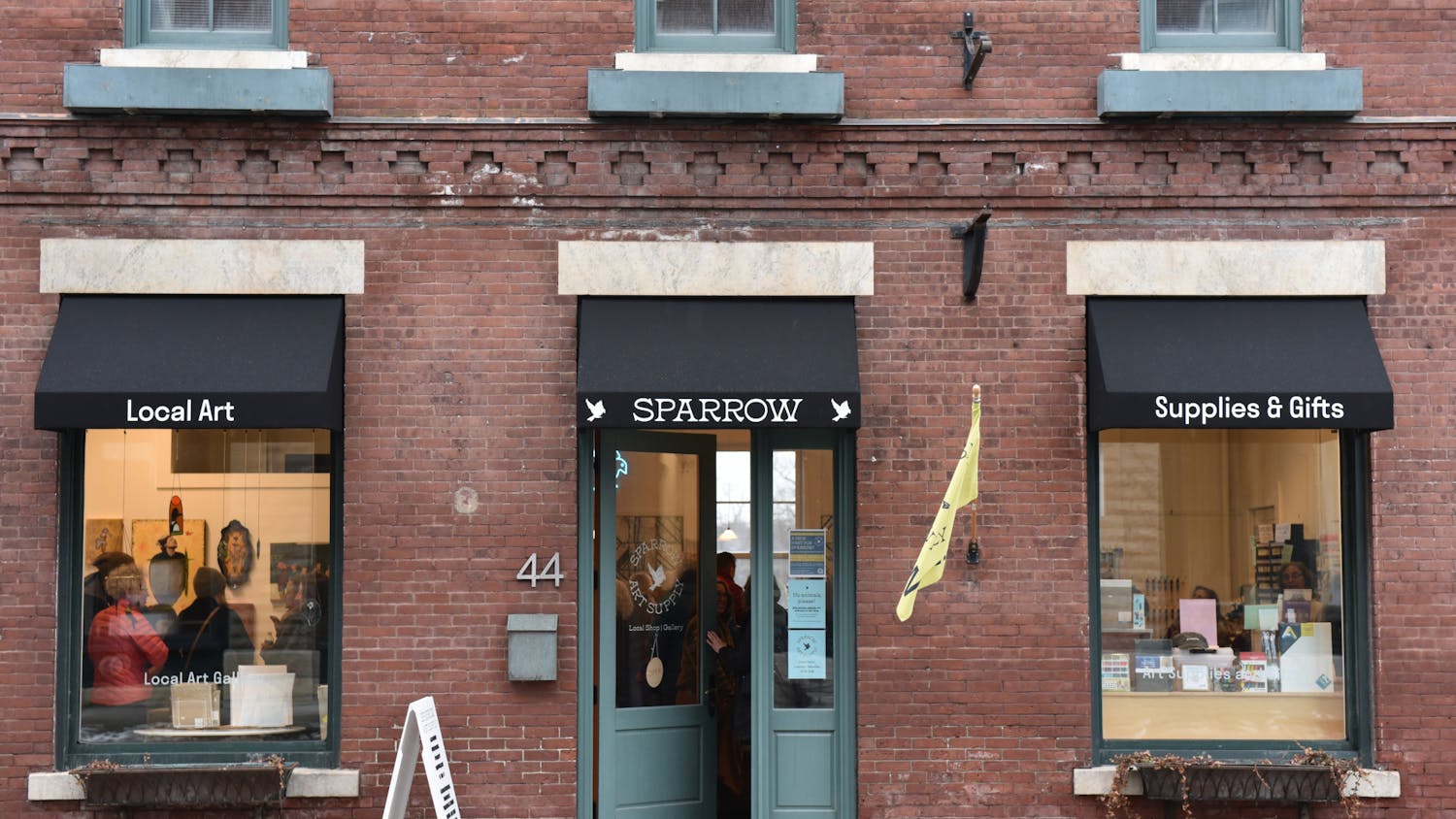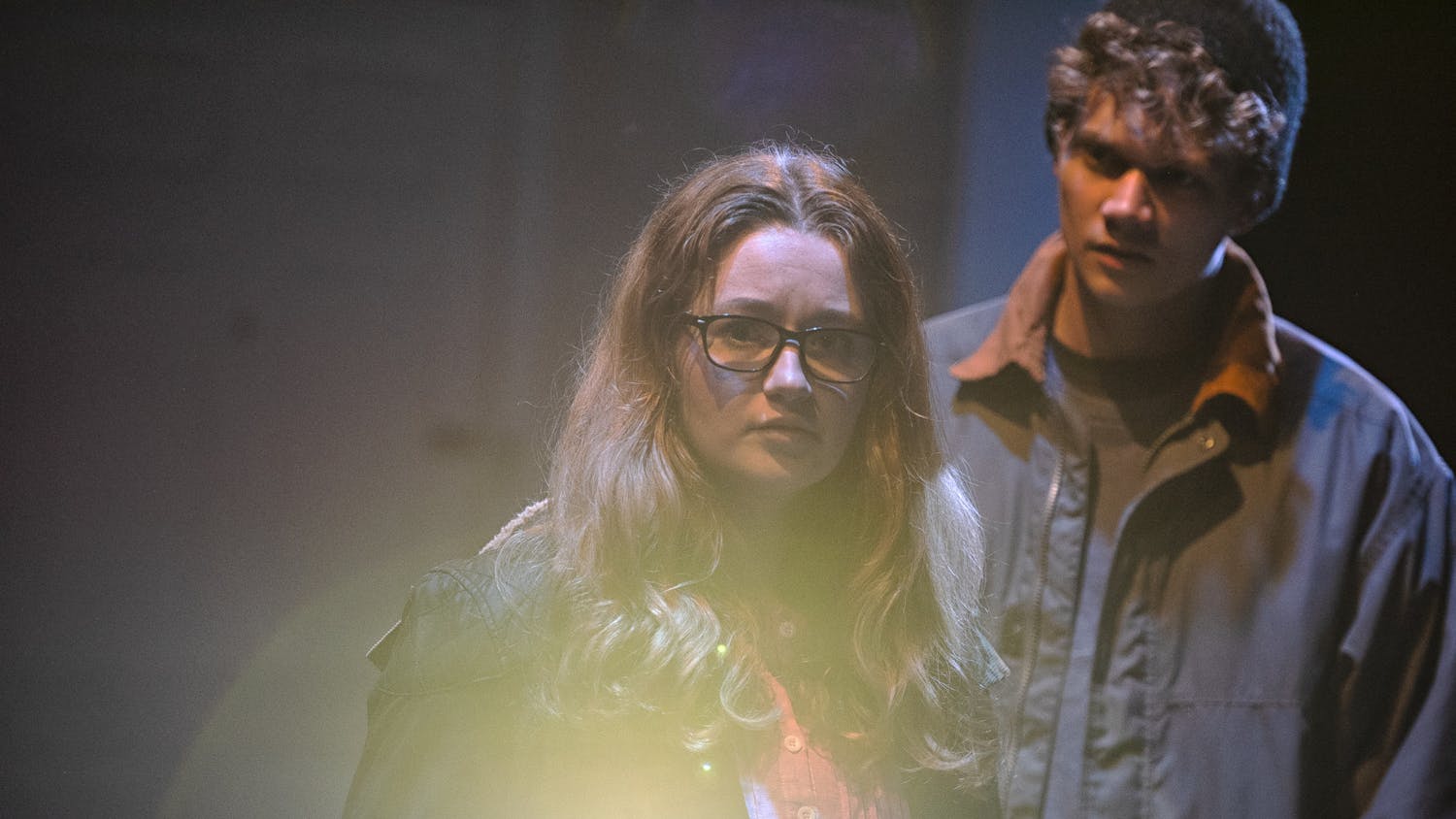Only in a show entitled Sexpectations would it make sense to utter the words “biddy,” “Atwater” and “Grindr” within mere minutes of each other. Last weekend (March 11-12), students flooded the Hepburn Zoo to watch the first ever play based on Middlebury hookup culture. Written and directed by Mary Baillie ’18 and Roxy Adviento ’18, Sexpectations was born from 57 anonymously submitted stories and brought to life by 10 students: Haroon Ashraf ’18, Sam Boudreau ’19, Stella Boye-Doe ’19, Emily Cipriani ’19.5, Ian Driscoll ’18.5, Lucie Heerman ’19, Ojaswi Pandey ’18, Madelyn O’Kelley-Bangsberg ’19.5, Omar Valencia ’19 and Elizabeth Warfel ’19. Following a mere two weeks of rehearsals, the cast danced, delivered monologues and occasionally donned scanty outfits in a humorous and at times uncomfortable reflection of life at the College.
Describing the show as “a series of depictions of the stupid stories that everyone has to go through every day at this place,” Baillie was intentional in portraying as many experiences as possible.
“We wanted to represent a diverse range of people, because hooking up can mean so many different things to different people,” she said. “We tried to use all the definitions.”
The play opens with a scene that is likely all too familiar (and cringe-worthy) to many: A swarm of sweaty bodies moves to a pulsing beat in an Atwater suite. The room smells of cheap alcohol, and an eager male student, played by Valencia, is in search of a hookup for the night. His inner monologue blares through the speakers as he surveys the room: “Okay, Matty. This is it. This is the night when you finally finally get some legit, real-life pussy. Do not f*ck this up.” When he finally finds Lisa, played by Cipriani, on the dance floor, awkwardness immediately ensues – from the moment he utters the phrase “Yeah, baby” in a misguided attempt at sexiness to a run-in with Lisa’s roommate that prevents the two of them from ever getting past first base.
The disastrous night ends with the roommate, portrayed by Boye-Doe, saying to Matty, “Umm....can you get the f*ck out now?” Overwhelming sympathy seemed to be the sentiment in the room, as the scene likely prompted audience members to relive their own awkward hookup experiences, be it untimely boners or a “cock-blocking” roommate.
A sense of goofy self-awareness pervaded much of the show, particularly in scenes centered on Tinder, the popular dating app, and Grindr, its gay-male equivalent. Tia, played by O’Kelley-Bangsberg, smiled and waved to the audience while an invisible narrator read her profile out loud in a tone so exaggeratedly serious, it could have fit right into a National Geographic documentary.
“Tia is a sex-positive gal looking to have fun. Sunglass emoji,” the narrator stated. “Ergo, she wants to weed out the creepers. Her pictures consist of one mysterious selfie, one sexy group with her friends, one smiling and one full body pic. Tia doesn’t want to work on her profile much because she is not THAT desperate.”
In acknowledging the ridiculous amount of thought that goes behind any online dating profile, Sexpectations perhaps validated many audience members’ own self-doubt.
Meanwhile, the Grindr skit featured a wide range of gay males, from an anonymous lurker to a toned, 6’1 guy who likes long walks on the beach, to the boldly named user “BottomBoy248.” Portrayed hilariously by Driscoll, this final character states with an unabashed eagerness that he enjoys “choking on cock, getting pounded hard, hands tied, rough stuff.” The crowd watched on curiously as the males attempted to navigate this provocative, complex and at times frustrating platform, where users may block other users upon receiving an unflattering face pic, have their boundaries pushed to uncomfortable extremes or arrange for a sexual interaction within minutes of virtually meeting one another.
Grindr can be a strange and scary place, but it can also lead to lighthearted fun between individuals who would not have otherwise connected. Sexpectations sought to shed light on both of these aspects. Baillie and Adviento consulted with members of the cast who were familiar with app to ensure that the scene was representative of Grindr culture. They explained that the characters they chose to spotlight did not stem from common stereotypes of gay males (although that may have seemed to be the case), but rather from real-life accounts of stereotypical Grindr profiles.
Amid the silly reenactments, the show gave way to several moments of somber reflection concerning inequity within heterosexual relationships. In a tense interaction between a male and female student, played respectively by Boudreau and Warfel, the boy demands a blow job from the girl on the false assumption that she will “want it again.” When she refuses, he responds, “What the f*ck?! Okay fine bitch, whatever.”
The emotional monologue that Warfel delivers in the next scene recognizes the “strange barbed wire of careful sexuality” that females must walk if they want to participate in college hookup culture.
“I like to have sex, have fun and be liberated. But there can only be so much, ya know?” Warfel states. “They see my body, I see theirs. But when they don’t even know my f*cking name, I literally become just a f*ckable body.”
Another point of concern arises during the Atwater scene, as bodies bump and shake against one another in the semi-darkness.
“Stop touching me!” one girl exclaims.
“Well, f*ck you then!” the random guy who is trying to grind on her responds.
In our world of structural gender inequality, women are simultaneously shamed for their sexuality and expected to go out of their way to please their male partners, regardless of their own desires. Meanwhile, consent exists as a blurry concept rather than as the bare minimum for all interactions. Sexism and double standards are not a problem of the past – and in refusing to shy away from the painful, lived experiences of individuals all around us, Sexpectations offered a powerful contribution to a dialogue that deserves far more attention than it currently receives on our campus.
Beyond the acknowledgement of harmful patriarchal norms, the show also brought to light subtle, but equally concerning, issues concerning race and gender. At one point, the characters all describe their “type.” Their answers include “smart athletes,” “Ben Wyatt,” “the slightly geeky but still coordinated music enthusiast,” “high IQ” and “someone who stops when I say ‘no’” – but some mention racial and ethnic stereotypes, such as “half Asian, half white guys,” “Jewish guys,” “black guys,” “Hispanics,” “Scandinavians” and “girls from Russia.” The fact that these phrases came from real-life submissions is concerning, as they reflect society’s tendency to fetishize members of different identity groups based on racist generalizations. Even worse, the problematic nature of these preferences often goes unchecked, since they are perceived as compliments rather than as objectification.
During the scene in which a girl makes out with her Atwater hookup, her “sexiled” roommate says angrily, “Wait, what?! I swear this is the third time!” to which she responds, “I’m no slut.” The culture of slut-shaming – that is, the sense of inferiority that society instills in young women whose sexual expression clashes with traditionally rigid, patriarchal norms – rings painfully clear in this exchange. Whether intentionally or not, Sexpectations brought this unfair double standard to light, and in doing so, hopefully pushed some audience members to think twice about their own choice of words.
It is unclear how aware the playwrights were of the implications behind these subtly problematic scenes. After all, the purpose of the show was to portray hookup culture on campus as it currently exists, not as how it ought to be. In terms of entertainment value, Sexpectations was a success, bringing laughter to every corner of the room and reminding us just how endearingly awkward young love can be when it is not taking place on the Atwater dance floor. On a more uncomfortable note, it also revealed the ways in which we, as a campus community and as products of large-scale media messaging, may not be nearly as progressive as we consider ourselves to be.
Sexpectations Discusses Hookup Culture

Comments



